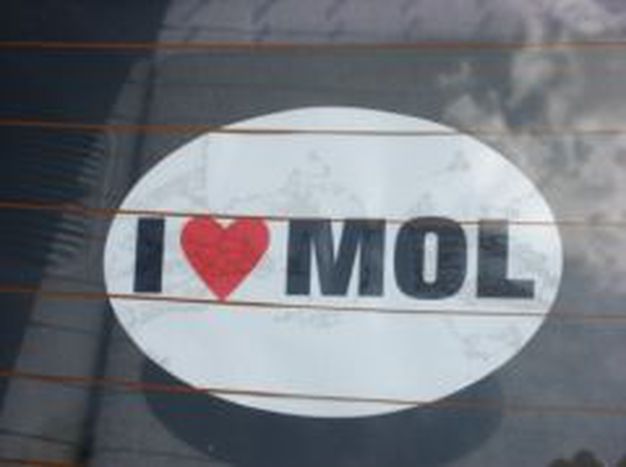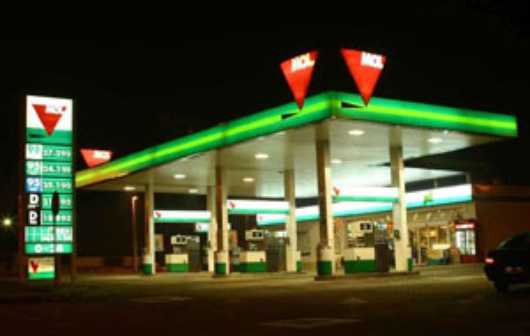
EC saved MOL from hostile takeover by OMV
Published on
August 7, 2008 OMV has scrapped its plan to acquire MOL and withdrawn its intention to make a $23 billion, Ft 32,000 per share bid to shareholders. OMV noted that the European Commission had issued a Statement of Objections outlining its concerns regarding OMV's potential merger with MOL, which were viewed as a hostile takeover by MOL.
Brussels said in July "The merger would remove MOL as the most significant regional constraint on OMV, and at the same time, remove OMV as the most significant constraint on MOL."
The Commission says OMV, which is making an unsolicited bid for MOL and operates the Schwechat refinery in Austria, would acquire two MOL refineries, Duna in Szazhalombatta, Hungary, and Slovnaft in Bratislava, Slovakia. According to OMV, further pursuit of a proposed merger with MOL under the given conditions would go against its economic and strategic rationale. OMV chief Wolfgang Ruttenstorfer remarked that he does not plan to step down after the failed takeover attempt. Ongoing lawsuits against MOL will not be withdrawn, he warned, adding that OMV does not intend to sell its 20% stake in MOL.
MOL acknowledged the announcement in a statement, saying the proposed merger of the two businesses had raised very serious competition issues, was “value-destructive” and had no economic or strategic justification. The firm said it will remain focused on protecting shareholder interests, and review future possibilities of the 20% stake held by OMV. In an interview, MOL CEO Zsolt Hernadi stated that MOL doesn’t plan any counterattack against OMV but looking at the efficiency of the Austrian company, he is happy to give advices to the corporate management of OMV, he added as a joke.
The dropping of the bid for MOL shares ends a year of bitter wrangling between Central Europe’s two largest oil companies, both of which are vying for regional dominance.
 Austrian-Hungarian energy dispute
Austrian-Hungarian energy dispute
December 5, 2007
OMV announced yesterday that it is suing MOL over restrictions on voting rights and other anti-takeover measures.
Sector peer OMV wants to remove the 10% ceiling on voting rights in the Hungarian energy company, abolish the state’s golden share in MOL and remove a restriction allowing only a limited number of board members to be replaced within a given period. Among others, the golden share gives the state a veto right over any attempt to remove the 10% voting ceiling.OMV also declared that it will propose an EGM if MOL management does not talk to it about a possible merger.
MOL rejected the idea of talks and reiterated its position that a merger of the two companies would destroy value.
OMV said that it had to file suit before the end of the this year, as it will lose the legal right to do so next year. The company has already filed a complaint with the European Commission against MOL’s restrictions on takeover bids. OMV is suing MOL at the Budapest Municipal Court.
MOL has spent over Ft 500 billion on buying its own shares, which serves the interest of management, not shareholders, OMV said. Moreover, OMV contends, MOL sold some of its own shares to management-friendly shareholders, making these ”quasi-treasury shares” whereas the law bans voting with treasury shares, OMV said.
”It is the two companies that have to agree,” OMV CEO Wolfgang Ruttenstorfer told reporters.
Maintaining its hard-line stance, MOL said OMV’s lawsuit is further proof that OMV plans a hostile takeover contrary to friendly communication. MOL continues to reject OMV’s ”unwanted and hostile” takeover attempt, a statement said. A merger or takeover would reduce shareholder value by $240 million annually, MOL added.
OMV confirmed its earlier offer to buy all MOL shares at Ft 32,000 per share, conditional on the removal of the 10% voting cap, and the cancellation of shares under management control.
If OMV is consistent it will also attack the decisions of the EGM, if shareholders vote with the management of MOL, so a protracted struggle can be expected, Hungarian daily Napi Gazdaság observes.
In the most likely scenario, OMV and MOL will merge in two to three years, said ING oil industry analyst Tamás Pletscher. The merger will be only meaningful if the Austrian lobby can stop the EU from ordering the sale of a refinery he remarked. If the merged company were forced to sell such a facility, he added, it would be the Százhalombatta refinery, which would most probably be bought by Russians.
Meanwhile, OTP announced that its MOL stake has fallen below 10%, as it has sold some of its shares.
AUSTRIAN - HUNGARIAN JOINT CABINET SESSION
November 29, 2007
The Schengen border will open between Hungary and Austria in three weeks and it is important that the two countries now jointly develop roads and cycle paths along the border, Hungarian Prime Minister Ferenc Gyurcsany told a joint Hungarian-Austrian government session on Thursday.
Austrian Chancellor Alfred Gusenbauer said direct co-operation between Hungary and Austria complemented co-operation within the European Union. He said it also helped Hungary and Austria to represent their interests jointly in the EU.
Gyurcsany told after the government session that recent attempts by Austrian oil company OMV to acquire Hungary's Mol had not been discussed at the meeting. He described the OMV-Mol affair as a no-win situation, but noted that it needed to be resolved by the companies and it was not up to the two governments to deal with it.
Gyurcsany congratulated to Austrian railways for winning a tender for the freight rail-transport business in Hungary.
Gusenbauer said co-operation in energy management was very important but government were only regulating its framework and did not get involved in details.
Gyurcsany thanked Austria for helping Hungarians during and after the revolution of 1956 and during post-communist transformation and said relations between the two countries were close.
Gyurcsany that Austria had given not only political assistance, but also human understanding and help to Hungarians over the years.



